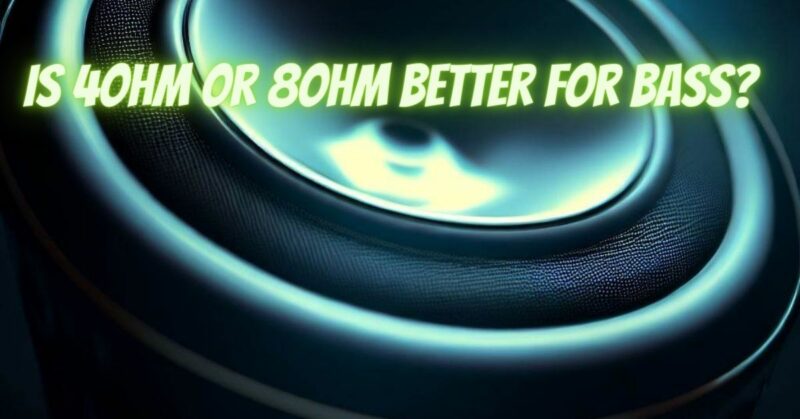In the world of bass amplification, the choice of speaker impedance is a pivotal factor that influences your bass tone, amplifier compatibility, and overall performance. The debate between using 4 ohm and 8 ohm speakers for bass setups is a common one, and each option brings its own set of advantages and considerations. In this article, we’ll explore the nuances of this choice, helping you determine whether 4 ohm or 8 ohm is better for your bass amplification needs.
Understanding Speaker Impedance
Speaker impedance, measured in ohms (Ω), refers to the electrical resistance that a speaker presents to the flow of alternating current (AC) from the amplifier. The choice of impedance affects several aspects of your bass setup, including power distribution, tonal characteristics, and amplifier compatibility.
Advantages of 4 Ohm Bass Speakers
- Power Handling: 4 ohm bass speakers can handle more power compared to 8 ohm speakers of similar construction. If you’re using a high-wattage amp head, 4 ohm speakers can maximize the potential power transfer, resulting in greater volume and headroom.
- Efficient Power Transfer: Lower impedance (4 ohms) typically allows for more efficient power transfer from the amplifier to the speaker. This can result in increased volume and potentially improved dynamic response, enhancing your bass playing experience.
- Low-End Emphasis: 4 ohm speakers can often provide a more pronounced low-end response due to the increased current flow. This can result in a more substantial and impactful bass presence.
- Amplifier Compatibility: Some high-powered bass amplifiers are designed to work optimally with lower impedance loads. Using 4 ohm speakers can allow you to fully utilize the amplifier’s capabilities.
Advantages of 8 Ohm Bass Speakers
- Versatility: 8 ohm bass speakers offer greater versatility in terms of compatibility. They can be used with a broader range of amplifiers without risking overloading the amplifier’s power output.
- Amplifier Longevity: Using 8 ohm speakers might put less strain on certain amplifiers, potentially contributing to longer amplifier lifespan and stability.
- Multiple Speaker Configurations: If you plan to use multiple speakers in your bass setup, 8 ohm speakers are often easier to manage in terms of impedance matching and connecting cabinets in series.
Choosing the Right Impedance for Your Bass Setup
Selecting between 4 ohm and 8 ohm speakers depends on various factors:
- Playing Style: Consider your preferred playing style and the genre of music you typically perform. If you need a powerful and authoritative bass presence, 4 ohm speakers might be preferable.
- Amplifier Power: If you have a high-wattage amplifier and seek maximum volume and dynamic range, 4 ohm speakers can help you achieve that goal.
- Amplifier Compatibility: If you have a range of amplifiers and want to maintain flexibility, 8 ohm speakers offer a wider range of compatibility without the risk of overloading certain amplifiers.
- Tonality: If you desire a more balanced and controlled bass tone, 8 ohm speakers might provide the nuanced response you’re seeking.
The decision between 4 ohm and 8 ohm bass speakers ultimately hinges on your specific playing style, equipment, and tonal preferences. Both options have their advantages, and the “better” choice varies depending on your unique context. By evaluating your needs, considering your amplifier’s specifications, and understanding the implications of impedance on your bass setup, you can make an informed decision that enhances your bass playing experience and allows you to achieve the desired tonal qualities with precision and impact.


